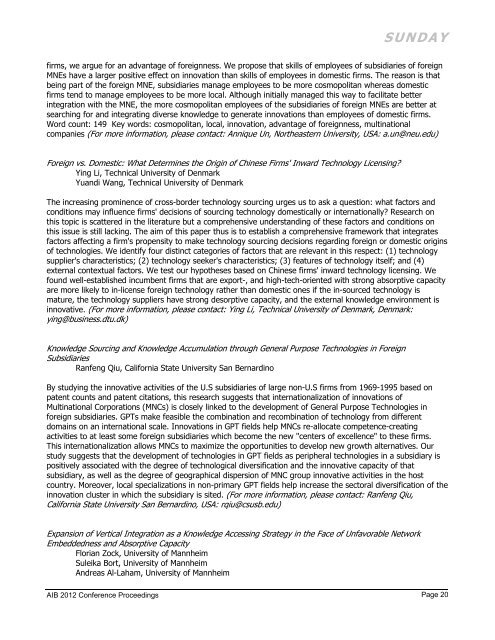AIB 2012 Conference Proceedings - Academy of International ...
AIB 2012 Conference Proceedings - Academy of International ...
AIB 2012 Conference Proceedings - Academy of International ...
Create successful ePaper yourself
Turn your PDF publications into a flip-book with our unique Google optimized e-Paper software.
SUNDAY<br />
firms, we argue for an advantage <strong>of</strong> foreignness. We propose that skills <strong>of</strong> employees <strong>of</strong> subsidiaries <strong>of</strong> foreign<br />
MNEs have a larger positive effect on innovation than skills <strong>of</strong> employees in domestic firms. The reason is that<br />
being part <strong>of</strong> the foreign MNE, subsidiaries manage employees to be more cosmopolitan whereas domestic<br />
firms tend to manage employees to be more local. Although initially managed this way to facilitate better<br />
integration with the MNE, the more cosmopolitan employees <strong>of</strong> the subsidiaries <strong>of</strong> foreign MNEs are better at<br />
searching for and integrating diverse knowledge to generate innovations than employees <strong>of</strong> domestic firms.<br />
Word count: 149 Key words: cosmopolitan, local, innovation, advantage <strong>of</strong> foreignness, multinational<br />
companies (For more information, please contact: Annique Un, Northeastern University, USA: a.un@neu.edu)<br />
Foreign vs. Domestic: What Determines the Origin <strong>of</strong> Chinese Firms' Inward Technology Licensing<br />
Ying Li, Technical University <strong>of</strong> Denmark<br />
Yuandi Wang, Technical University <strong>of</strong> Denmark<br />
The increasing prominence <strong>of</strong> cross-border technology sourcing urges us to ask a question: what factors and<br />
conditions may influence firms' decisions <strong>of</strong> sourcing technology domestically or internationally Research on<br />
this topic is scattered in the literature but a comprehensive understanding <strong>of</strong> these factors and conditions on<br />
this issue is still lacking. The aim <strong>of</strong> this paper thus is to establish a comprehensive framework that integrates<br />
factors affecting a firm's propensity to make technology sourcing decisions regarding foreign or domestic origins<br />
<strong>of</strong> technologies. We identify four distinct categories <strong>of</strong> factors that are relevant in this respect: (1) technology<br />
supplier's characteristics; (2) technology seeker's characteristics; (3) features <strong>of</strong> technology itself; and (4)<br />
external contextual factors. We test our hypotheses based on Chinese firms' inward technology licensing. We<br />
found well-established incumbent firms that are export-, and high-tech-oriented with strong absorptive capacity<br />
are more likely to in-license foreign technology rather than domestic ones if the in-sourced technology is<br />
mature, the technology suppliers have strong desorptive capacity, and the external knowledge environment is<br />
innovative. (For more information, please contact: Ying Li, Technical University <strong>of</strong> Denmark, Denmark:<br />
ying@business.dtu.dk)<br />
Knowledge Sourcing and Knowledge Accumulation through General Purpose Technologies in Foreign<br />
Subsidiaries<br />
Ranfeng Qiu, California State University San Bernardino<br />
By studying the innovative activities <strong>of</strong> the U.S subsidiaries <strong>of</strong> large non-U.S firms from 1969-1995 based on<br />
patent counts and patent citations, this research suggests that internationalization <strong>of</strong> innovations <strong>of</strong><br />
Multinational Corporations (MNCs) is closely linked to the development <strong>of</strong> General Purpose Technologies in<br />
foreign subsidiaries. GPTs make feasible the combination and recombination <strong>of</strong> technology from different<br />
domains on an international scale. Innovations in GPT fields help MNCs re-allocate competence-creating<br />
activities to at least some foreign subsidiaries which become the new "centers <strong>of</strong> excellence" to these firms.<br />
This internationalization allows MNCs to maximize the opportunities to develop new growth alternatives. Our<br />
study suggests that the development <strong>of</strong> technologies in GPT fields as peripheral technologies in a subsidiary is<br />
positively associated with the degree <strong>of</strong> technological diversification and the innovative capacity <strong>of</strong> that<br />
subsidiary, as well as the degree <strong>of</strong> geographical dispersion <strong>of</strong> MNC group innovative activities in the host<br />
country. Moreover, local specializations in non-primary GPT fields help increase the sectoral diversification <strong>of</strong> the<br />
innovation cluster in which the subsidiary is sited. (For more information, please contact: Ranfeng Qiu,<br />
California State University San Bernardino, USA: rqiu@csusb.edu)<br />
Expansion <strong>of</strong> Vertical Integration as a Knowledge Accessing Strategy in the Face <strong>of</strong> Unfavorable Network<br />
Embeddedness and Absorptive Capacity<br />
Florian Zock, University <strong>of</strong> Mannheim<br />
Suleika Bort, University <strong>of</strong> Mannheim<br />
Andreas Al-Laham, University <strong>of</strong> Mannheim<br />
<strong>AIB</strong> <strong>2012</strong> <strong>Conference</strong> <strong>Proceedings</strong><br />
Page 20

















